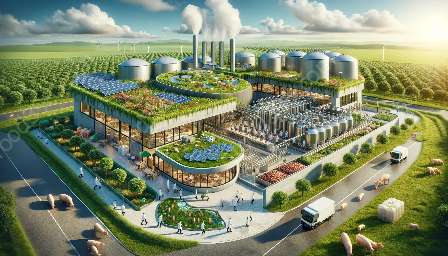Meat processing waste and by-products pose significant environmental challenges, necessitating effective treatment methods. This content focuses on the chemical and biological treatments for meat processing waste, exploring their compatibility with meat by-products and waste management. We'll delve into sustainable solutions in meat science, shedding light on innovative processes and technologies.
The Impact of Meat Processing Waste
Meat processing waste comprises organic and inorganic substances, including fats, proteins, and minerals. Improper disposal of these by-products can lead to pollution of air, soil, and water bodies, posing health hazards and environmental degradation. Chemical and biological treatment methods offer promising approaches to mitigate these impacts, transforming waste into valuable resources.
Chemical Treatments for Meat Processing Waste
Various chemical treatments can effectively treat meat processing waste. The use of acids, alkalis, and oxidizing agents aids in breaking down organic matter, reducing pathogen levels, and neutralizing odors. Furthermore, these treatments can facilitate the recovery of useful by-products such as proteins and fats, contributing to a more sustainable waste management paradigm.
Acid Hydrolysis
Acid hydrolysis involves the use of strong acids to break down organic compounds into simpler molecules. This process not only reduces the organic load in the waste but also enables the extraction of valuable amino acids and peptides, which can be utilized in various industrial applications.
Alkaline Treatment
Alkaline treatment, utilizing substances like lime or sodium hydroxide, helps in saponifying fats, thereby separating them from the waste stream. This process is essential for the recovery of fats, which are then transformed into biodiesel or utilized in other industries, contributing to the circular economy.
Oxidation Processes
Oxidation processes, such as ozone or hydrogen peroxide treatment, are effective in breaking down organic matter and removing odor-causing compounds. These methods also aid in disinfecting the waste, making it safer for further processing or disposal.
Biological Treatments for Meat Processing Waste
Biological treatments harness the power of natural microorganisms to degrade organic matter and remediate meat processing waste. Microbial processes, such as aerobic and anaerobic digestion, are sustainable and eco-friendly solutions for handling organic waste streams.
Aerobic Digestion
Aerobic digestion involves exposing the waste to oxygen, creating an environment suitable for aerobic microorganisms to thrive. These microorganisms break down organic compounds, producing carbon dioxide, water, and stabilized organic residues. The resulting by-products can be used as soil amendments or converted into biogas for energy production.
Anaerobic Digestion
Anaerobic digestion operates in an oxygen-deprived environment, facilitating the growth of anaerobic bacteria to decompose organic matter. This process generates biogas, primarily methane, which can be utilized as a renewable energy source. Additionally, the digested waste material serves as a nutrient-rich fertilizer, offering dual benefits in waste management and resource recovery.
Compatibility with Meat By-Products and Waste Management
The chemical and biological treatments for meat processing waste align with the principles of circular economy and sustainable waste management. By recovering valuable materials from the waste stream, such as proteins, fats, and organic residues, these treatments support the utilization of meat by-products in various industries, reducing the overall environmental footprint of meat processing.
Sustainable Solutions in Meat Science
Advancements in chemical and biological treatments are integral to the evolution of sustainable solutions in meat science. By integrating innovative processes and technologies, the meat industry can enhance its waste management practices, minimize environmental impact, and optimize resource utilization.
Conclusion
The chemical and biological treatments for meat processing waste offer a compelling pathway towards sustainable waste management and resource recovery. Through these innovative methods, meat by-products can be transformed into valuable materials, contributing to a more circular and eco-friendly approach in meat science and waste management.

